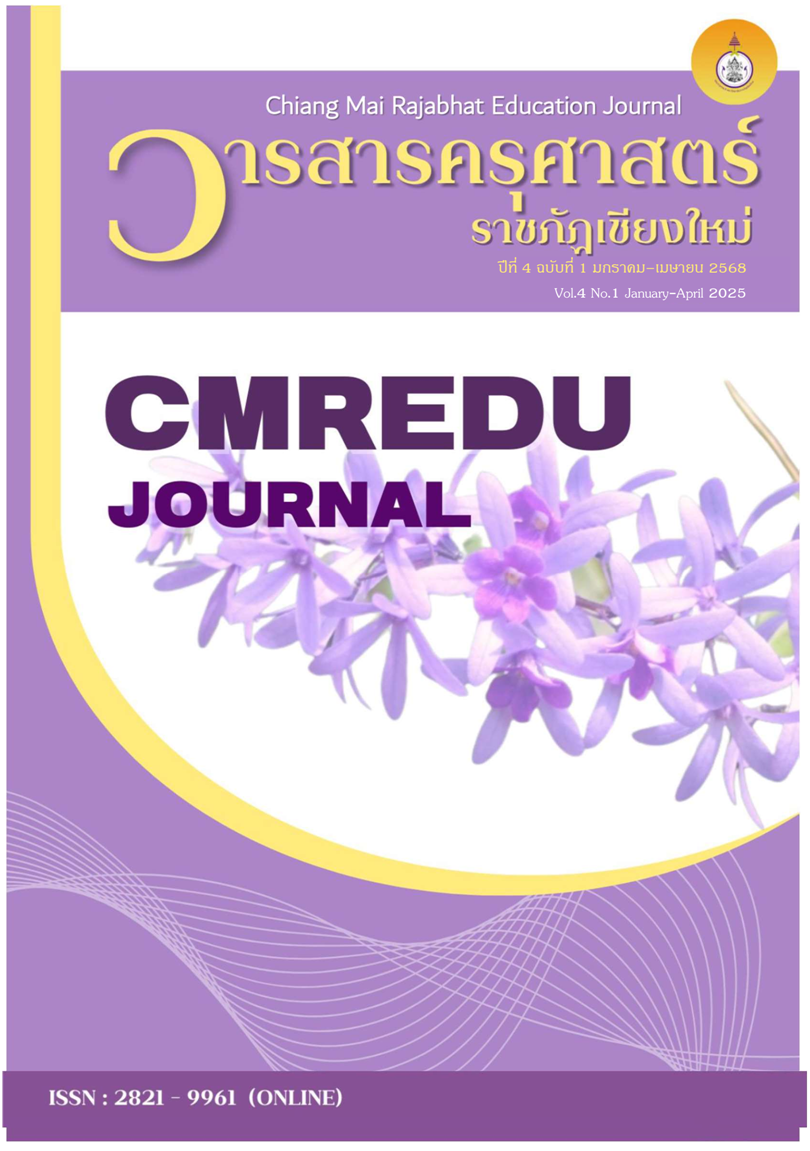A Comparison of Internal Benchmarking and the Development of Classroom Research Competency
Keywords:
Internal Benchmarking, Teacher Competency Development, Classroom Research CompetencyAbstract
Internal Benchmarking is the process of comparing internal operations within an organization by identifying exemplary individuals with good practices within the organization, comparing differences in work processes, and then integrating these insights into one’s own work by setting goals for change. The process of Internal Benchmarking consists of six steps: Planning, Analysis, Integration, Action, Reflection, and Adaptation. This approach is utilized to enhance research competencies in classrooms, including research skills, leadership and research management abilities, critical thinking skills, communication skills, information technology proficiency, lifelong learning, ethics, and legal compliance. It fosters exemplary outputs, cultivate a culture of continuous learning and development within the organization and enhances the ability to solve learners' learning problems and improve teaching processes. It also helps teachers and researchers to effectively refine teaching methods and develop innovative approaches that are more suited to their specific contexts.
Downloads
References
กระทรวงศึกษาธิการ. (2566). นโยบายและจุดเน้นของกระทรวงศึกษาธิการ ประจำปีงบประมาณ พ.ศ.2567. https://moe360.blog/2023/01/04/policy-and-focus-moe-fiscal-year-2024/
โชติ บดีรัฐ. (2558). เทคนิคการบริหาร. สำนักพิมพ์จุฬาลงกรณ์มหาวิทยาลัย.
ณัฏฐพันธ์ เขจรนันทน์. (2544). ยอดกลยุทธ์การบริหาสำหรับองค์การยุคใหม่. เอ็ดซเปอร์เน็ท.
นริสรา พึ่งโพธิ์สภ. (2562). คุณลักษณะของความเป็นเลิศและปัจจัยความสำเร็จของการทำงานวิจัยที่เป็นเลิศของนักวิจัยที่ได้รับรางวัลนักวิจัยดีเด่นแห่งชาติ. มหาวิทยาลัยศรีนครินทรวิโรฒ.
ปกรณ์ ประจัญบาน. (2560). การพัฒนาองค์ประกอบ ตัวชี้วัด และเกณฑ์การประเมินคุณลักษณะจิตวิจัยของนักวิจัยระดับบัณฑิตศึกษา. วารสารศึกษาศาสตร์ มหาวิทยาลัยนเรศวร. 19(1); 11-22.
มนสิช สิทธิสมบูรณ์. (2563). การวิจัยในชั้นเรียน. โรงพิมพ์มหาจุฬาลงกรณ์ราชวิทยาลัย.
สถาบันบัณฑิตพัฒนบริหารศาสตร์. (2560). กรอบแนวคิดสำหรับมาตรฐานอาชีพและคุณวุฒิวิชาชีพสาขาวิจัย. https://ssed.nida.ac.th/images/jsd/Y22_1/6_Narisara_Peungposopa.pdf
สมคิด บางโม. (2562). องค์การและการจัดการ. ซีเอ็ดยูเคชั่น.
สำนักงาน ก.ค.ศ. (2560). หลักเกณฑ์และวิธีการให้ข้าราชการครูและบุคลากรทางการศึกษา ตำแหน่งครูมีวิทยฐานะและเลื่อนวิทยฐานะ. https://otepc.go.th/images/00_YEAR2561/03_PV1/w21.pdf
สำนักงานคณะกรรมการการวิจัยแห่งชาติ (วช.). (2556). จรรยาบรรณนักวิจัย. https://dric.nrct.go.th/Policy/8
สำนักงานคณะกรรมการข้าราชการพลเรือน (ก.พ.). (2561). คู่มือสมรรถนะข้าราชการพลเรือนไทย. สำนักงานคณะกรรมการข้าราชการพลเรือน.
สำนักงานเลขาธิการสภาการศึกษา. (2565). การพัฒนางานวิจัยให้มีคุณภาพและใช้ประโยชน์ได้จริง. เอส. บี. เค. การพิมพ์.
สำนักงานเลขาธิการสภาการศึกษา. (2566). รายงานแนวทางการส่งเสริมการวิจัยทางการศึกษาสู่การปฏิบัติ. เพชรเกษมพริ้นติ้ง กรุ๊ป.
สุวิมล ว่องวานิช. (2557). การวิจัยปฏิบัติการในชั้นเรียน. (พิมพ์ครั้งที่ 17). สำนักพิมพ์แห่งจุฬาลงกรณ์มหาวิทยาลัย.
อิทธิพัทธ์ สุวทันพรกูล. (2561). การวิจัยทางการศึกษา: แนวคิดและการประยุกต์ใช้. โรงพิมพ์จุฬาลงกรณ์มหาวิทยาลัย.
McClelland, D. C. (1973). Testing for Competence Rather Than Intelligence. American Psychologist. 28(1), 1-4.
Shermon, G. (2004). Competency based HRM: A Strategic resource for competency mapping, assessment and development centre. Tata McGraw-Hill.
Spencer, L. M. & Spencer, S. M. (1993). Competence at work: Models for superior performance. John Wiley & Sons.

Downloads
Published
How to Cite
Issue
Section
License
Copyright (c) 2025 Chiang Mai Rajabhat Education Journal

This work is licensed under a Creative Commons Attribution-NonCommercial-NoDerivatives 4.0 International License.
Journal of TCI is licensed under a Creative Commons Attribution-NonCommercial-NoDerivatives 4.0 International (CC BY-NC-ND 4.0) licence, unless otherwise stated, Please read our Policies page for more information on Open Access, copyright and permissions.





